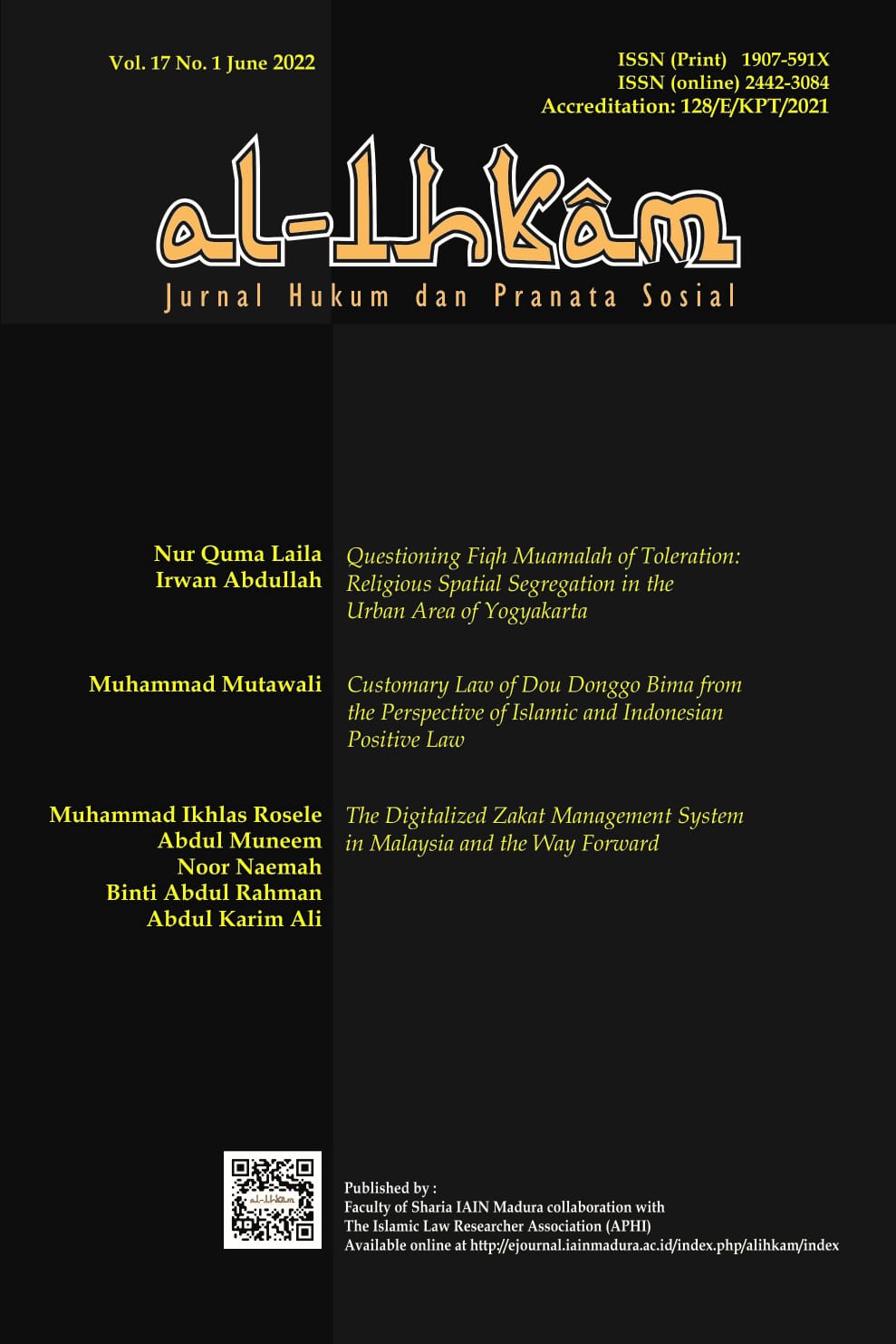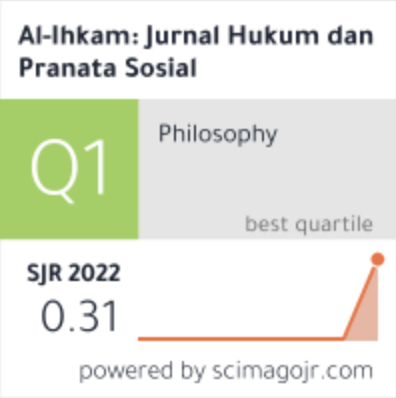Customary Law of Dou Donggo Bima from the Perspective of Islamic and Indonesian Positive Law
 Abstract views: 891
,
Abstract views: 891
,
 PDF downloads: 746
PDF downloads: 746
Abstract
The community (dou) of Donggo uses their local wisdom and customary law to deal with legal matters within its society. Both are believed as truth and fulfilling the sense of justice within the community that upheld peace values. Therefore, it has been preserved for a long time until today. Practically, customary law enforcement is implemented by a customary law institution called Lembaga Adat dan Syari’at Donggo/Donggo’s Customs and Sharia Council (LASDO). This study is a normative legal study with statutory, comparative, and case approaches putting three legal decisions of LASDO as its material object. Data are collected through interviews and studies of the relevant documents consisting of primary ones; customary law, jurisprudence, and Islamic law references, and the secondary one; relevant research results, and the works of legal experts. The statutory and comparative. analysis employed in this study led to the finding that the contemporary Donggo community still employs the customary laws, such as baja and flogging law in solving the criminal cases namely rape, theft, and adultery. The sanctions imposed by LASDO in these three cases are different from the punishments contained in the KUHP. While compared to Islamic law, there are similarities in spirit and type of punishment yet different in the sentence form.
Downloads
References
Al-Faruk, Asadulloh. Hukum Pidana Dalam Sistem Hukum Islam. Bogor: Ghalia Indonesia, 2009.
Amdani, Yusi. “Konsep Restorative Justice Dalam Penyelesaian Perkara Tindak Pidana Pencurian Oleh Anak Berbasis Hukum Islam Dan Adat Aceh.” Al-‘Adalah XIII, no. 1 (2016): 73. https://doi.org/https://doi.org/10.24042/adalah.v13i1.1130.
Asshiddiqie, Jimly. Pembaharuan Hukum Pidana Indonesia. Bandung: Angkasa, 1996.
Et.al, Dahlia Farida. “Legal Protection for Disputing Parties Through the Aceh Customary Court.” Legal Protection for Disputing Parties Through the Aceh Customary Court 5, no. 1 (2020): 32. https://doi.org/https://doi.org/10.19105/al-ihkam.v15i1.2250.
Grafika, Redaksi Sinar. KUHAP Dan KUHP. Jakarta: Sinar Grafika, 2014.
Hidayatullah, Syarif. “Tindak Pidanan Kesusilaan Dalam Perspektif Hukum Pidana Islam.” Al-Mizan 4, no. 1 (n.d.): 49.
Ismail, M. Hilir. “Maja Labo Dahu Sebagai Falsafah Hidup Pada Masa Kini.” Bima, 2001.
Israfil, Muhammad Irfan and. “Baja Bima Customary Sanction an Alternative Policy of Corruption Actors in Bima Regency West Nusa Tenggara.” ULREV: Unram Law Review 1, no. 1 (2017). https://doi.org/DOI: https://doi.org/10.29303/ulrev.v1i1.10.
Just, Peter. Dou Donggo Justice: Conflict and Morality in an Indonesian Society. Lanham, Md: Rowman dan Little field, 2001.
Mamudji, Soerjono Soekanto and Sri. Penelitian Hukum Normatif. Jakarta: Raja Grafindo Persada, 2015.
Marzuki, Peter Mahmud. Penelitian Hukum. Jakarta: Prenada Media Kencana, 2016.
Molasy, Honest Dody. “The Implementation of Islamic Law in Indonesia; What Should We Learn from Suku Donggo.” In Conference Proceedings 12th AICIS. Surabaya, 2012.
Mudzhar, Muhammad Atho. “Kreativitas Mencari Judul Dan Pisau Analisis Dalam Studi Syari`ah Dan Hukum.” Jakarta, 2019.
Muhammad, Rusjdi Ali. Revitalisasi Syari`at Islam Di Aceh: Problem, Solusi Dan Implementasi. Jakarta: LOGOS, 2003.
Mutawali, Muhammad. “Implementasi Hukum Islam Di Kesultanan Bima.” Schemata 3, no. 2 (2014): 182.
———. Islam Di Bima: Implementasi Hukum Islam Oleh Badan Hukum Syara` Kesultanan Bima (1947-1960). Mataram: Alamtara and IT Press, 2013.
Noorduyn, J. “Makasar and The Islamization of Bima.” Bijdragen Tot de Taal-, Land- En Volkenkunde Deel 143, no. 2/3de Afl (1987): 316.
Nurhayati. “Pelaksanaan Tindak Pidana Pemerkosaan: Studi Komparasi Antara Hukum Islam Dan Qanun Jinayat Di Aceh.” Al-Manahij XII, no. 1 (2018): 22.
Pide, A. Suriyaman Mustari. Hukum Adat, Dahulu, Kini Dan Akan Datang. Jakarta: Prenada Media Kencana, 2017.
Rahmat Abduh. “Tindak Pidana Perkosaan (Studi Komparatif Antara Hukum Pidana Dan Hukum Islam).” Wahana Inovasi 3, no. 1 (2014): 221.
Ridwan. “Perkembangan Dan Eksistensi Hukum Adat: Dari Sintesis, Transplantasi, Integrasi Hingga Konservasi.” Jurnal Jurisprudence 6, no. 2 (2016): 109. https://doi.org/https://doi.org/10.2391/jurisprudence.v6i2.3008.
Salahuddin, Henri Chamber Loir dan Siti Maryam R. Bo’ Sangaji Kai: Catatan Kerajaan Bima. Jakarta: Ecole Francaise d`Extreme-Orient, Yayasan Pustaka Obor, 2012.
Tim Revitalisasi Hukum Adat Bima (ForPuan, FKPT, Nasyiatul Aisyiah, CeDes, BPMPP Kabupaten Bima. “Adat-Adat Bima Yang Tercecer, Dari Penelitian Tentang Revitalisasi Lembaga Adat Di Tengah Kegalauan Identitas Diri.” Center of Development Studies, 2008.
Zainuddin. “Hukuman Bagi Pelaku Perkosaan Anak Di Bawah Umur.” ISTI’DAL: Jurnal Studi Hukum Islam 4, no. 2 (2017): 133.
Zuhayli, Wahbah. Al-Fiqh Al-Islami Wa Adillatuh. Dimashqa: Dar al-Fikr al-‘Ilmiyah, 1997.
Copyright (c) 2022 AL-IHKAM: Jurnal Hukum & Pranata Sosial

This work is licensed under a Creative Commons Attribution-ShareAlike 4.0 International License.
In order to be accepted and published by Al-Ihkam: Jurnal Hukum dan Pranata Sosial, author(s) submitting the article manuscript should complete all the review stages. By submitting the manuscript, the author(s) agreed to the following terms:
- The copyright of received articles shall be assigned to Al-Ihkam: Jurnal Hukum dan Pranata Sosial as the publisher of the journal. The intended copyright includes the right to publish articles in various forms (including reprints). Al-Ihkam: Jurnal Hukum dan Pranata Sosial maintain the publishing rights to the published articles.
- Authors are permitted to disseminate published articles by sharing the link/DOI of the article at Al-Ihkam: Jurnal Hukum dan Pranata Sosial. Authors are allowed to use their articles for any legal purposes deemed necessary without written permission from Al-Ihkam: Jurnal Hukum dan Pranata Sosial with an acknowledgment of initial publication to this journal.
- Users/public use of this website will be licensed to CC-BY-SA.



.png)
_1.png)










